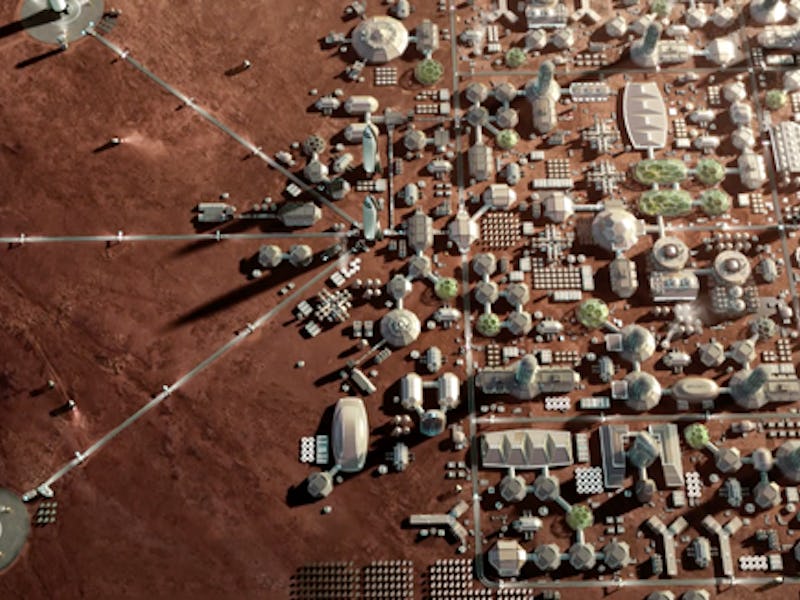Musk Reads: SpaceX's Mars City Gets Interplanetary Internet
AMOS-17 gets lift off; an interplanetary internet takes shape; the Starship lunar plan begins.

AMOS-17 gets lift off; an interplanetary internet takes shape; the Starship lunar plan begins. It’s Musk Reads: SpaceX Edition #95.
A version of this article appeared in the “Musk Reads” newsletter. Sign up for free here.
Musk Quote of the Week
“Between $100B and $10T…approx min payload to Mars to nearest order of magnitude, so at $100k/ton, cost would be $100B.”
- Musk on how much it would cost to build a self-sustaining city on Mars, based on needing to send one million tons of cargo. Read more about what life would be like in this Mars city and how SpaceX plans to build the city by 2050.
SpaceX
Lift off! SpaceX’s AMOS-17 mission launched from Cape Canaveral Air Force Station in Florida on August 6 at 7:23 p.m. Eastern time. The firm’s 10th mission of the year saw a slight delay due to a suspect valve on the August 1 static test fire, which led to a second test fire on August 4. This was the third flight for the Falcon 9 booster, after the Telstar-19 and Es’hail 2 missions, and SpaceX did not attempt a recovery. Moments after, the team successfully caught the fairing using the Ms. Tree ship, which led to some of the company’s most impressive images and videos. Following the mission, SpaceX was spotted using a second ship that could be used to catch the other half of the fairing. Read more
NASA astronauts got to grips with the Crew Dragon in a new series of images, despite the fact that the planned “Demo-2” mission has no clear launch date. Robert Behnken and Douglas Hurley suited up for the first manned flight of the capsule at the SpaceX headquarters in Hawthorne, California.
The capsule is expected to enable NASA to ferry astronauts to and from the International Space Station without depending on Soyuz rockets, but the Government Accountability Office has warned both SpaceX and Boeing face “chronic delays” in their plans to develop a solution. Read more
SpaceX Starship
Musk’s dream of making humans a multi-planetary species may be a distant dream, but those future inhabitants could turn up with internet access ready to go. Inverse spoke with Ben Lamm last week, CEO of Hypergiant Industries that’s aiming to build such a network using a collection of satellites that bounce signals through the fastest route. It’s working with the Arch Mission Foundation, which provided Isaac Asmov’s Foundation trilogy for Musk’s red Roadster on the Falcon Heavy’s February 2018 maiden voyage. The partnership will mean that those satellites will store a 30-million-page backup of all human knowledge. Read more
That internet access could be put to good use soon, as Musk’s Starship plans come further into focus. Details emerged last week that the “Starhopper” is expected to serve as part of the orbital prototype after it completes its next hop test. Musk claimed on Saturday that he’s spoken with the Federal Aviation Authority about possibly flying the Starhopper on a 200-meter jump sometime between August 16 and 18. A successful test will set up Musk well for a planned presentation on August 24 to further discuss future plans for the Starship.
The ship is expected to serve for missions like a trip around the moon and a manned mission to Mars. Read more
What’s next for SpaceX: Musk is set to take the stage on August 24 to explain more about the Starship, the current state of the project, and what comes next in the plan to send humans to Mars.
Photo of the Week
Falcon 9 soars.
The Elonporium
Subscribe to Inverse Loot and learn about these deals first.
The Ultra-Fine Print
This has been Musk Reads: SpaceX Edition #95, the weekly rundown of essential reading about futurist and entrepreneur Elon Musk. I’m Mike Brown, an innovation journalist for Inverse.
- Sponsor Musk Reads and get your business in front of a brainy, curious audience: advertising@inverse.com.
- Email me directly at mike.brown@inverse.com and follow Inverse on Twitter @inversedotcom. Follow me on Twitter @mikearildbrown.
- Got any comments or queries? Don’t forget to send them over to muskreads@inverse.com.
A version of this article appeared in the “Musk Reads” newsletter. Sign up for free here.